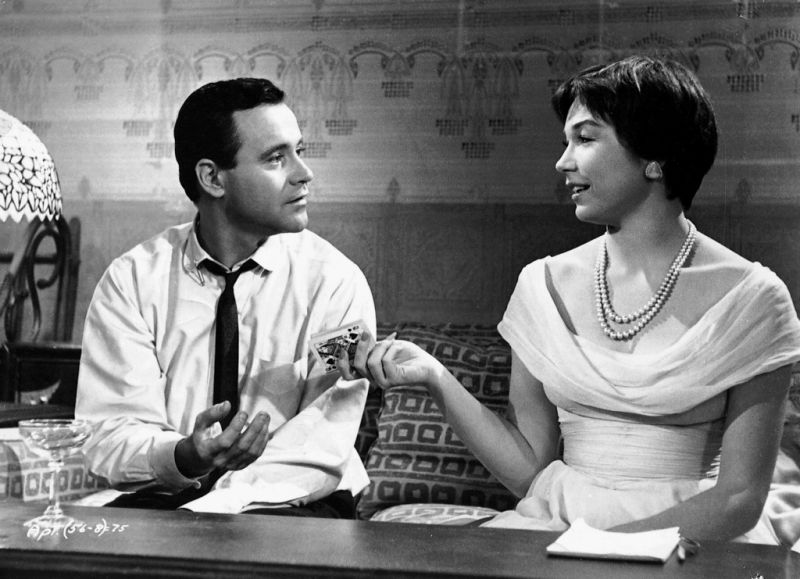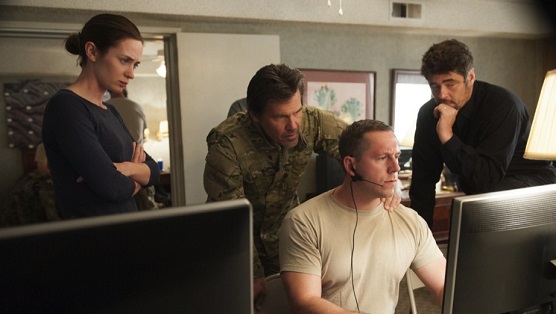6. The Level of Incompetence (Passion, 2012)

According to hierarchiologist Laurence J. Peter, every employee’s successes will be rewarded with a promotion until the employee reaches her “level of incompetence,” or the purgatorial position she’s not only unable to advance from, but is also unable to carry out on a daily level.
Sometimes this inability to function is due to an increased workload, obscure responsibilities, or a lack of creativity – other times it stems solely from the defensive nature of her inferior superior who takes full credit for her employee’s wild success in order to hold onto her prestigious position.
In Passion, the bullet-proof glass ceiling that advertising executive Isabelle finds herself unable to penetrate takes the form of her overseer Christine, as corporate crab mentality quickly degenerates the pair’s initial erotic camaraderie into the sort of violent and ambiguous dilemma that likely didn’t exist in the public consciousness before Alfred Hitchcock.
Alongside murder, blackmail, and prescription drug addiction, one of the most indecent outcomes of the film is the thought of Isabelle’s creative brilliance being misattributed for the rest of her career, and the psychological repercussions having no voice will have in her professional future.
7. The Abhorrent Ascension (The Apartment, 1960)

Suffering through years of manipulation, the occupational payoff one receives for sticking with his exploitative employer long enough to break free from the prolonged period of implicit hazing is immeasurable. Sure, one could compare his salaries and perks to the dismal per-hour profits accrued in his early days, but the relationships he’s built with his nickname-toting, back-slapping managers is the real positive payback.
If only they would all stop using his apartment as a rendezvous for illicit affairs – a longstanding agreement definitely unrelated to his recent series of promotions – everything would be perfect.
The Apartment sheds light on the rampant manipulative behavior poisoning the workspace on a much higher bureaucratic level, diagnosing corporate greed as more Darwinian than merely sadistic or unempathetic. As a result of the highest-ups’ untameable lust, divergently-virtuous Bud Baxter is stiff-armed into peddling his soul (and his flat) for the sake of his reputation, while the women of the office are emotionally manipulated into abetting Baxter’s bosses every night.
Meanwhile, the other weak-willed Buds of the office are sure to be passed over for more significant promotions due to their incompatibility with the morally bankrupt management. Who needs skills and qualifications when office politics are the only relevant factor to climbing the corporate ladder?
8. The First Attempt at Escape (Time Out, 2001)

Despite the constant feeling of shame and a deeply-wounded pride courtesy of a long-time, heartless employer, the indescribable despair you sink into once you’re finally let go by your company reaches depths previously unfelt – not so much because you miss your work, but because you have a family to feed and, more importantly, an extra-professional dignity that you cling to like a life preserver.
Time Out recreates a familiar scenario for the cast-to-sea protagonist who’s unable to tread water on his own, but is even less capable of enlisting aid. Rather than coming clean to an understanding wife and children, Vincent opts to involve himself in white collar criminal activity at the direct expense of old friends.
As reiterated by another family-man-gone-rogue in a recent popular U.S. TV series, the debasement to a life of crime undoubtedly appeals to Vincent due to the fact that he’s finally found an adequate alternative to the inevitable career path where more legitimate metrics can be used for measuring success.
Though the caustic clash with a mid-life crisis drags Vincent to the moral depths of peddling knock-off designer goods, he reaches his most detached immediately after being fired when he’s absorbed himself in his own fantasy of working on the road.
Rather than half-assing an alibi to toss at his inquisitive wife, Vincent fully engulfs himself in a fictional new position, complete with work trips, progress reports, and board meetings which he eavesdrops on arbitrarily. As cruel as it is to take a man’s job away after over a decade of service, it’s significantly more savage to rewire his brain with a purely artificial hierarchy of needs.
9. The Bureaucracy’s Level of Incompetence (Sicario, 2015)

Sometimes when you prove your competence, maintain composure, play by all the rules and still manage to reach the very top of the corporate ladder, what you find is that the bureaucratic system you’ve spent your career climbing is, itself, incompetent, disorganized, and totally unlawful.
As a devoted employee, though, you do your best to roll with the sometimes-literal punches while keeping your moral compass set – that is, until you possess too much privileged information, and an outside party takes the liberty of forfeiting any personal freedom to divulge said information to the authorities by placing a gun to your head.
An exemplar of bureaucratic agnosticism, Sicario presents an epilogue to the rational-minded maternal instinct in the androgynous worker, which has been totally eclipsed by the any-means-necessary paternity demonstrated by only the most cutthroat employee.
Leaving absolutely no room for error and refusing to admit fault for their shortcomings, the multitude of acronymic investigation teams involved in the film’s major operation leave it to a ruthless mercenary to complete their work, who later informs one of the most qualified team members that she’s not fit for the job.
As an outsider to the system – as well as a homicidal loon – his opinion probably means less than those of her male colleagues, which, should be mentioned, are very similar to his. If it’s any consolation, the gut punch she receives from her supervisor pales in comparison to the bullet she takes from her hired-assassin partner.
10. The Second Attempt at Escape: An Ambitious Stab at Early Retirement (Lost in America, 1985)

When your company bones you for the last time by transferring you to New York rather than delivering on their implicit promise of a big promotion, it seems there’s nothing left to do but storm out of your office in a profanity-laced gesture of exasperation, sell all your belongings, and travel across the country with your equally-detached wife in your new RV. But what do you have left without your career – or your life savings, which have sensationally vanished less than twenty-four hours into your trip?
Lost In America poses a grim threat to the unstable dream of cashing in one’s assets and making a break for it. Despite red flags previously flown by the unlikely pairing of a Dennis Hopper screenplay and Candide’s opus, David and Linda Howard set out to discover a pre-bureaucratic nation, only to imminently uncover boredom, vice, and poverty, almost losing each other in the process.
Marital vows notwithstanding, a steady income appears to be the only certainty in this world, and without it you’re merely one craps table away living the rest of your life on a day’s wage and a severely dated countercultural fantasy.